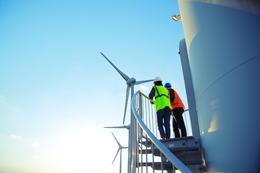
Insight
Community Energy: empowering a Just Transition
A blog written by Sarah Charsley, who recently completed her masters degree at the University of Edinburgh and wrote her dissertation on how the recent energy crisis has impacted a just energy transition and how engagement with community energy might have changed as a result of the crisis.
As we enter another winter of extreme temperatures and high energy bills, many are continuing to search for a way to mitigate the long-term effects of the recent energy crisis and keep their homes warm. Community energy is one approach that has empowered communities while paving the way for a more sustainable future.
At the heart of community energy lies the principle of collective ownership and shared responsibility for energy generation. This decentralised approach challenges the traditional power dynamics that have left vulnerable communities disproportionately burdened by rising energy costs and environmental degradation. By decentralising energy production, community energy shifts power towards those who need it most, enabling them to take control and break free from the reliance on traditional energy giants.
The benefits of community energy extend far beyond ownership. By fostering local energy efficiency initiatives and encouraging prosumer behaviours, community energy schemes empower households to substantially reduce their energy consumption and lower their energy bills. According to Community Energy England’s State of the Sector report, a remarkable £3.35 million has been saved by households through participation in community energy projects, a testament to the sector’s effectiveness in alleviating the financial strain of fuel poverty and empowering communities to take charge of their energy expenses.
Community energy also plays a pivotal role in advancing the just energy transition, a concept that emphasises fairness and equity in the shift towards a low-carbon energy system. By promoting local ownership and participation in renewable energy development, community energy schemes ensure that no one is left behind in this essential transition. This inclusive approach fosters self-engagement with the transition, encouraging involvement from groups that have traditionally been overlooked in energy sector decision-making processes. As communities become actively involved in shaping their energy future, the benefits of this transition are shared more equitably across society, ensuring that no one is disproportionately burdened by the costs.
Furthermore, the expansion of community energy schemes further stimulates growth within the renewable energy sector, as more and more groups embrace their own green energy infrastructures. This increased engagement fuels research and development, creating educational opportunities for a broader spectrum of individuals, fostering a wider understanding of renewable energy technologies and their potential to revolutionise the energy landscape. As communities develop their own energy solutions, a shared knowledge base around renewable energy emerges, fostering a deeper understanding of the industry, its economic benefits, and its environmental implications. This knowledge empowers individuals to make informed decisions about their energy consumption and contribute to a more sustainable future.
While community energy is not without its challenges, it offers a powerful tool to enhance societal resilience against future energy shocks and propel us towards a just energy transition. Community energy projects can mitigate the impact of rising energy costs, reduce reliance on fossil fuels, and empower communities to take control of their relationship with energy. As we navigate the complexities of the energy transition, community energy stands as a beacon of hope, offering a transformative approach that benefits both society and the environment.
